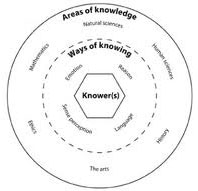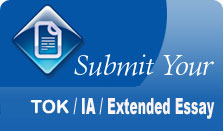IB ToK Essay
Keep the following guidelines in mind:
-
the word count is 1600 words. This includes quotations.
-
You have to write down the number of words when you submit the essay.
-
The examiner will not read past 1600 words.
-
references, maps/charts/illustrations and bibliographies are not included in the word count.
-
You can choose any standard referencing system, but be consistent with the one you chose
To avoid possible disappointment, there are three very important things to keep in mind. Firstly, you should answer the question as it is. If you change the nature of the essay question or go off into your own direction, you risk losing a lot of marks. The examiner will assess the essay against the prescribed title. So, if you write something completely different, you may even get a 0. Regularly (and explicitly) bring your essay back to the essay question. Secondly, you should make sure that your essay is about "how we know". This means that you should not write lots of facts and information in the style of an answer to an exam question of an IB DP subject. You should also avoid writing an essay in the style of your EE. Your TOK essay is a reflective, analytical essay about how we know. Finally, you should write clearly. You may think you can impress the examiner with difficult words and complex grammar, because you feel that TOK is an intellectual subject. However, if what you write makes no sense, you won"t get many marks. Re-read your work or ask a friend to see whether they understand what you mean. Ultimately, the IB ToK course is assessed by two components; TOK essay and TOK exhibition.
- TOK essay is of 1200-1600 words, written on a title chosen from a list of six offered by the IB. TOK essay carries 67% worth of your final TOK grade.
TOK essay topics for may 2024 are as follows
-
Is subjectivity overly celebrated in the arts but unfairly condemned in history? Discuss with reference to the arts and history.
-
How can we reconcile the opposing demands for specialization and generalization in the production of knowledge? Discuss with reference to mathematics and one other area of knowledge.
-
Nothing is more exciting than fresh ideas, so why are areas of knowledge often so slow to adopt them? Discuss with reference to the human sciences and one other area of knowledge.
-
Do we underestimate the challenges of taking knowledge out of its original context and transferring it to a different context? Discuss with reference to two areas of knowledge.
-
Do we need custodians of knowledge? Discuss with reference to two areas of knowledge.
-
Are we too quick to assume that the most recent evidence is inevitably the strongest? Discuss with reference to the natural sciences and one other area of knowledge.
The "brand new" TOK exhibition is worth 33% of the grades. It is assessed internally, but moderated externally. The exhibition aims to assess how you can apply TOK concepts to the real world. You have to complete the exhibition individually (no group work!) and make sure no one in your TOK class/school uses the same objects/images in their exhibition. In short, the TOK exhibition is a live or virtual exhibition of three objects based on one "IA prompt". You should choose one prompt from the list below (it must be exactly from this list- DO NOT change the wording) and find three objects or images of objects that relate to this prompt.
You also have to create a document with the title of your IA prompt, the images of the three objects, a commentary on each object that identifies each object and its specific real-world context. The comment should also justify the inclusion of the object in the exhibition and explain the links to the IA prompt. Finally, you should also include appropriate citations and references. The total word count for this document is 950 words (excluding references).
To create the exhibition you should follow three steps:
1) Choose the IA prompt and (images of) objects,
2) Prepare the documents for moderation
3) Showcase the exhibition.
1 a) Choose the IA prompts from the list of prescribed IA prompts (see below).
- What counts as knowledge?
- Are some types of knowledge more useful than others?
- What features of knowledge have an impact on its reliability?
- On what grounds might we doubt a claim?
- What counts as good evidence for a claim?
- How does the way that we organize or classify knowledge affect what we know?
- What are the implications of having, or not having, knowledge?
- To what extent is certainty attainable?
- Are some types of knowledge less open to interpretation than others?
- What challenges are raised by the dissemination and/or communication of knowledge?
- Can new knowledge change established values or beliefs?
- Is bias inevitable in the production of knowledge?
- How can we know that current knowledge is an improvement upon past knowledge?
- Does some knowledge belong only to particular communities of knowers?
- What constraints are there on the pursuit of knowledge?
- Should some knowledge not be sought on ethical grounds?
- Why do we seek knowledge?
- Are some things unknowable?
- What counts as a good justification for a claim?
- What is the relationship between personal experience and knowledge?
- What is the relationship between knowledge and culture?
- What role do experts play in influencing our consumption or acquisition of knowledge?
- How important are material tools in the production or acquisition of knowledge?
- How might the context in which knowledge is presented influence whether it is accepted or rejected?
- How can we distinguish between knowledge, belief and opinion?
- Does our knowledge depend on our interactions with other knowers?
- Does all knowledge impose ethical obligations on those who know it?
- To what extent is objectivity possible in the production or acquisition of knowledge?
- Who owns knowledge?
- What role does imagination play in producing knowledge about the world?
- How can we judge when evidence is adequate?
- What makes a good explanation?
- How is current knowledge shaped by its historical development?
- In what ways do our values affect our acquisition of knowledge?
- In what ways do values affect the production of knowledge?






